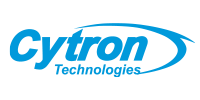Không có sản phẩm trong giỏ hàng!

Raspberry Pi Success Stories Across Industries
- Abdulrahman Alhamed
- 01 Sep 2023
- News
- 1186
The Raspberry Pi has emerged as a true game-changer across industries. From factories to healthcare, and hospitality to digital signage, its impact has gone beyond limits and rewritten success stories. In this article, we take you on a journey through the remarkable achievements made possible by the Raspberry Pi. Join us as we explore how this unassuming single-board computer has ignited innovation and reshaped possibilities in a wide array of sectors.
Brompton
Brompton, famous for their innovative folding bicycles, has embraced the power of Raspberry Pi in its London-based factory to make their success even bigger. They faced a challenge: keeping track of their production as more people wanted their bikes. So, they brought in Raspberry Pi computers to help out. Starting in 2013 with a line of nine production stations, they later expanded to 16 to meet increased demand, ultimately requiring more efficient tracking and monitoring capabilities.
Over a hundred Raspberry Pi devices, including Raspberry Pi 4 and earlier models, have been deployed across Brompton's factory. These devices play diverse roles, from monitoring pre-assembly and production lines to ensuring air quality control. The Raspberry Pi computers on production stations actively scan bicycle serial numbers, enabling real-time tracking of each unit's assembly progress. This data is leveraged for multiple purposes, such as providing assembly instructions to staff through connected displays, automating plate design for laser-etching machines, and assisting staff in meeting time targets through LED indicators.
Bio Business
Bio Business hit a challenge when they aimed to produce IoT monitoring devices for big companies like Siemens, GE, and Philips. These devices required precise environmental measurements like temperature and air quality for patients. But making all these devices connect to the cloud was a complex task. The company needed to remotely monitor machines like MRIs and CT scanners while ensuring a consistent supply of components for their expanding portfolio.
Bio Business turned to Raspberry Pi Compute Module 4 and RP2040 microcontrollers. Their CPAP device, which aids in maintaining a patient's airway, utilized RP2040 to monitor oxygen levels and manage power inputs and pressure sensors. Additionally, they introduced a Raspberry Pi-based oxygen concentrator that efficiently utilizes ambient air for oxygen supply, allowing users to adjust the flow.
By using Raspberry Pi technology, Bio Business not only overcame obstacles in production and connectivity but also became leaders in bringing together medical equipment and smart technology like IoT.
KwickPOS
KwickPOS, a Houston-based venture founded by tech enthusiasts Tom Jin and Ming Ye, began its journey in 2003 by crafting a Linux-based point-of-sale system for a Chinese restaurant. The success of their innovation spread quickly, leading to a transition into a full-fledged business in 2015. However, they encountered challenges. The issue lay in the expensive Windows systems, which were both prone to theft and occupied a lot of space. KwickPOS found a breakthrough with Raspberry Pi, using it to create discreet yet powerful terminals for restaurants. Their browser-based POS system, backed by Raspberry Pi servers, offered offline functionality—a crucial advantage in areas with internet disruptions. This resilience not only made them stand out but also made them better in the competition.
Yodeck
Yodeck has become a thriving participant in the global digital signage market, projected to reach $45 billion by 2030. CEO Vangelis Mihalopoulos initially ventured into the market with a PC-based offering, but struggled to find widespread success. Challenges arose from the high cost and limited scalability of their solution.
Recognizing the need for a more efficient and adaptable approach, Mihalopoulos and his team turned to Raspberry Pi. They crafted a Python-based application to run on Raspberry Pi, effectively managing content playback, scheduling, and device management. This allowed Yodeck to create an affordable yet powerful digital signage platform that automatically pushed content to client devices, ensuring consistent messaging across various displays and locations.
This innovation was driven by Mihalopoulos' insight into the industry's requirements and Raspberry Pi's impressive capabilities. By leveraging Raspberry Pi's flexibility and performance, Yodeck successfully established a reliable and cost-effective digital signage solution for clients ranging from large corporations to local businesses, solidifying their position in the competitive market.
Conclusion
The Raspberry Pi's impact knows no bounds. From factories to healthcare and beyond, its success stories illuminate the path to a more innovative future, where possibilities are limitless. So, stay tuned for the remarkable possibilities that technology like the Raspberry Pi can bring to our world!
References:
Related Products
IRIV PiControl - Bộ Điều Khiển Công Nghiệp IR4....
7,989,300₫++ 8,877,000₫++ 7,263,000₫
 International
International Singapore
Singapore Malaysia
Malaysia Thailand
Thailand Vietnam
Vietnam